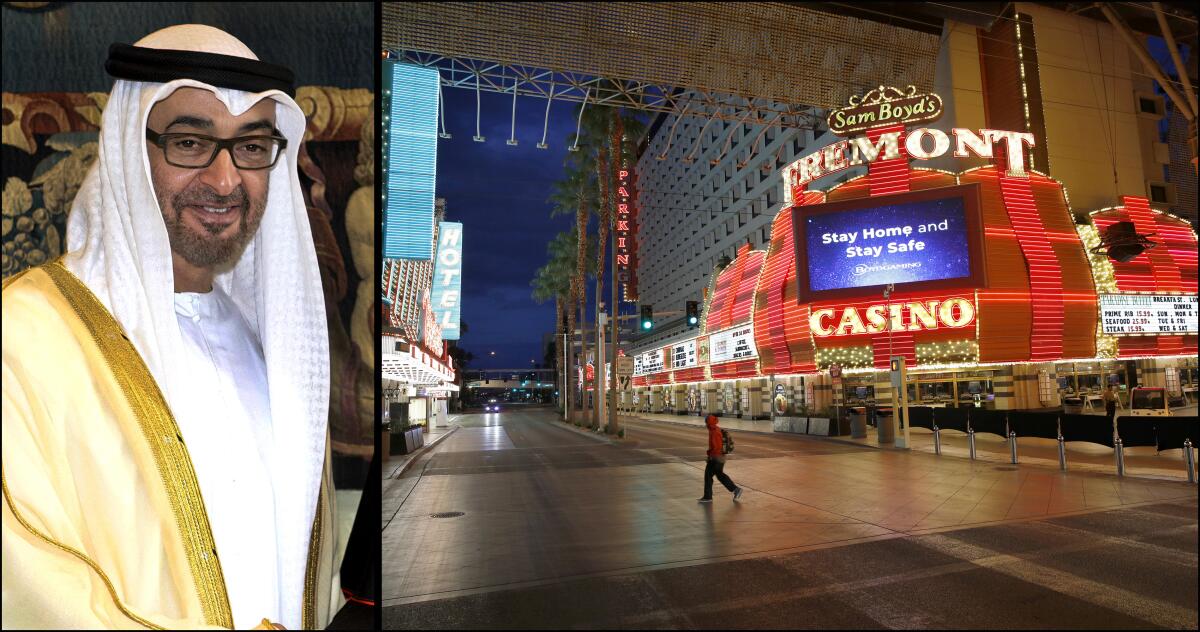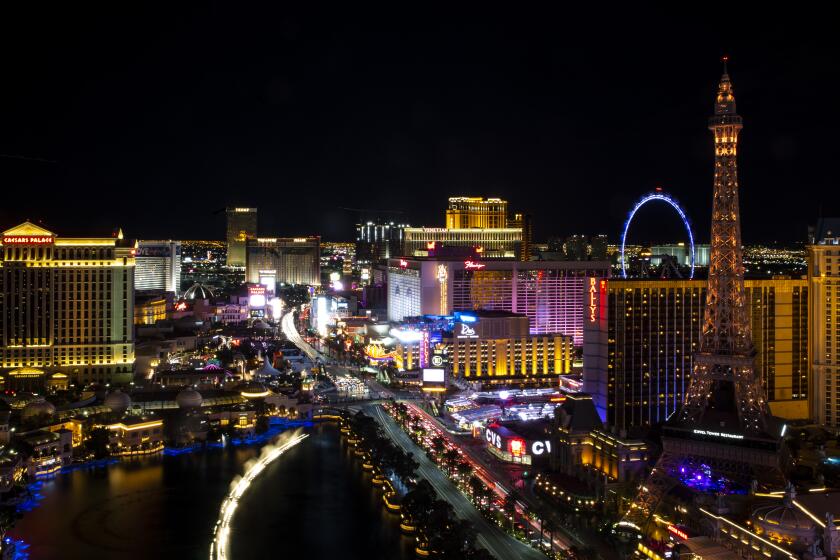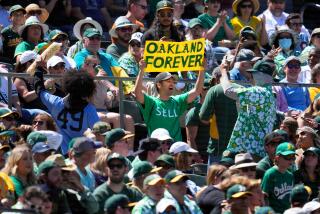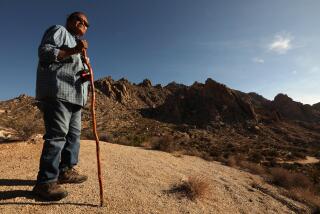Las Vegas needed help testing for coronavirus. Then a crown prince stepped in

WASHINGTON — One of the largest mass coronavirus testing sites in Nevada has opened in Las Vegas, a move that puts the city one step closer to reopening its economy. And it might not have been possible without the donation of more than 200,000 test kits, worth as much as $20 million, from the United Arab Emirates.
Within weeks of the coronavirus reaching Las Vegas, members of the public were clamoring to be tested, and hospitals and laboratories were running out of supplies. Nasal swabs were so difficult to come by that some clinics closed, and state officials called on the federal government for help.
Help did arrive in Las Vegas. Supply chains eased, allowing hospitals to buy more tests, and aid trickled in from Washington.
But the intervention that changed the state’s fortunes was a large donation from Mohammed bin Zayed al Nahyan, the crown prince of Abu Dhabi and de facto ruler of the United Arab Emirates, according to members of Nevada’s COVID-19 Response, Relief and Recovery Task Force, a group of business leaders supporting the state’s recovery.
Jim Murren, the former chief executive of MGM, who chairs the task force, said this week that the gift was the result of discussions with G42, an Emirati artificial intelligence and cloud-computing company. Although talks initially centered on how to bring back concerts and sports events to Las Vegas during the epidemic, Murren said his counterparts in the United Arab Emirates quickly realized Nevada didn’t have enough test supplies to help stem the spread of the disease.
At the time, the state could only manage to test hundreds, not thousands, of people daily. Those who did get tested endured lengthy wait times for results as their samples were shipped out of state to private labs in California or Arizona that could take as long as two weeks to deliver an answer. By the time state health officials learned someone had tested positive, it was too late to prevent them from spreading the virus.
Nevada Gov. Steve Sisolak will make the final announcement Tuesday at a news conference. Vegas hotel-casinos look to reopen soon.
“It really defeated the purpose from a public health standpoint,” said Dr. Luis Medina-Garcia, an infectious disease specialist at University Medical Center of Southern Nevada.
In mid-April, Prince Mohammed, or MbZ, as he’s commonly known, gave the state more than 200,000 test kits, with the aim of easing shortages and accelerating Nevada’s timeline for reopening its economy.
“Without the connection with the U.A.E., we might be in a different place,” Murren said. “It really gave University Medical Center a real shot in the arm.”
He estimated the value of the country’s donation in the range of $15 million to $20 million, based on the Medicare reimbursement rate for test kits.
In addition to offering humanitarian relief, the United Arab Emirates has a financial interest in seeing Vegas come back to life. Dubai World, the state-controlled investment vehicle of Dubai, owns half of the sprawling CityCenter complex, which when it opened in 2009 on the Strip was the largest and most expensive private development in the city.
As of last week, Nevada Gov. Steve Sisolak has allowed hair salons, restaurants, outdoor malls, retailers and barbershops to reopen with strict social-distancing requirements. But the core of the state’s economy — the casinos, nightclubs, spas and lounges that make Vegas an international destination — have been closed since mid-March.
“Testing is an economic imperative,” Murren said. “I don’t think we could possibly sustainably reopen an economy anywhere — certainly not in a tourist-based economy like Nevada’s — unless we can improve consumer confidence.”
Nevada has received money and supplies from the Federal Emergency Management Agency but nothing that approaches the scale or the speed of the United Arab Emirates’ donation. According to state health officials, FEMA has equipped Nevada with 26,000 testing swabs and 25,600 testing transport components. More supplies are on the way, officials said, but the shipments haven’t arrived.
Nevada and Colorado join a Western regional pact to fight the coronavirus outbreak while moving toward reopening businesses, easing stay-at-home orders.
For Murren and others on the task force, the United Arab Emirates’ gift is a sign of the relationships Vegas business leaders have cultivated overseas. But public health experts, who praised the donation, said it was also an indictment of the U.S. government’s halting response.
Since the outbreak of the coronavirus in the United States, severe testing shortages have hamstrung states’ efforts to understand how extensively the virus has spread and to make decisions about opening up again. Across the country, healthcare officials initially limited testing to people who had traveled to virus hot spots and those showing symptoms.
The School of Medicine at the University of Nevada, Las Vegas, warned in early April that its supplies were running so low, it would have to stop taking appointments until more test kits arrived.
The Emirati donation “is reflective of the failure of the federal government to step up to its responsibility to make sure that in a time of scarcity every community gets the resources they need to respond to this pandemic,” said Jeffrey Levi, a professor of health policy at George Washington University.
“Good for Las Vegas that they have been able to find these resources,” Levi added, “but communities that don’t have these kinds of contacts should not be placed at greater risk because of that.”
Medina-Garcia said that, at the very beginning of the outbreak, University Medical Center was testing fewer than a hundred people each day and had only a few machines that could process samples. When it nearly ran out of swabs, it continued to test patients by drawing on donated supplies from Abu Dhabi.
The medical center is now capable of administering 5,000 tests daily and is expected to double that number by June, when several of Las Vegas’ largest casinos are hoping to reopen.
As of now, employees at major casinos and resorts can make appointments to get tested at the city’s convention center, the result of a collaboration between University Medical Center, the local culinary workers union and three of the largest employers on the Las Vegas Strip: MGM Resorts, Caesars Entertainment and Boyd Gaming. It will be one of the largest mass testing sites in Nevada, able to serve several thousand people a day, and key to the gradual reopening of the city’s tourism-based economy.
“I think we wouldn’t be where we are if we didn’t have those partners helping everybody out,” Medina-Garcia said. “When you’re not able to provide a service to the community because you don’t have a nasal swab, it doesn’t matter if you have the best of the infrastructure in place. You can’t move forward.”
More to Read
Get the L.A. Times Politics newsletter
Deeply reported insights into legislation, politics and policy from Sacramento, Washington and beyond. In your inbox three times per week.
You may occasionally receive promotional content from the Los Angeles Times.












